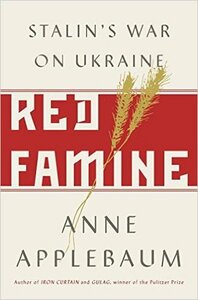Take a photo of a barcode or cover
Well researched and educational, but my heart couldn't take it when they talked about the effects of famine on children. Very disturbing and heartwrenching
Graphic: Violence, Cannibalism, War
emotional
informative
informative
sad
challenging
dark
informative
reflective
sad
slow-paced
It felt a bit dense at first, but thrn it gained momentum. Its so sad that in the end the USSR got its way even after WWII. The denial narrative, the accusations of fanatical nationalism and Nazism against Ukraine, while Nazis planned to do the exact same, and there were Ukrainian soldiers in the troops that helped defeat Hitler are ridiculous. They, the USSR, even got away with reshaping the definition of genocide so that they wouldn't get accused of it.
Memory eternal to all victims, dissidents and truth bearers who dared to speak out.
Memory eternal to all victims, dissidents and truth bearers who dared to speak out.
Graphic: Child death, Chronic illness, Death, Eating disorder, Genocide, Hate crime, Mental illness, Panic attacks/disorders, Torture, Xenophobia, Cannibalism, Murder, Colonisation, War, Deportation
I opened this book with the knowledge most people have. The Holodomor was a famine in Ukraine that killed millions of people. Every aspect of why and how are documented here to paint an utterly complete picture.
Red Famine tells the story of Soviet repression. How year after year the cultural intelligentsia and civil society were decimated and repressed, exiled, and eliminated. For decades Ukrainian nationalism was subverted and fractured and famine by mostly natural causes was exacerbated by civil war but ameliorated by foreign aid and honest effort. From there, things get worse.
Applebaum is able to document exactly what crossed Stalin's desk, how he responded, how local activists acted and were disillusioned, and how nearly every action destroyed the countryside. Taxes turned to percentages turn to absolute requisitions. Criminal elements were exploited to persecute kulaks. Internal dissent was eliminated or ignored. Special shops existed to sell food for jewelry to extract the last of wealth for Stalin's international ambitions.
Ukraine was a tempest of bad policy, bad decisions, paranoia, and the cruelest inhumanities for the sole purpose of crushing dissent and extracting resources. You will not be able to look away from this book, and you shouldn't.
The last 50 pages draw a direct line from the bad history of the Soviet Union to the forces that conspire to deny Ukrainian determination and history. The whole world and those leaders after Stalin were so unmoved by their legacy that generations continue to be shocked at the unknown history of this country, even though their struggle continues.
Red Famine tells the story of Soviet repression. How year after year the cultural intelligentsia and civil society were decimated and repressed, exiled, and eliminated. For decades Ukrainian nationalism was subverted and fractured and famine by mostly natural causes was exacerbated by civil war but ameliorated by foreign aid and honest effort. From there, things get worse.
Applebaum is able to document exactly what crossed Stalin's desk, how he responded, how local activists acted and were disillusioned, and how nearly every action destroyed the countryside. Taxes turned to percentages turn to absolute requisitions. Criminal elements were exploited to persecute kulaks. Internal dissent was eliminated or ignored. Special shops existed to sell food for jewelry to extract the last of wealth for Stalin's international ambitions.
Ukraine was a tempest of bad policy, bad decisions, paranoia, and the cruelest inhumanities for the sole purpose of crushing dissent and extracting resources. You will not be able to look away from this book, and you shouldn't.
The last 50 pages draw a direct line from the bad history of the Soviet Union to the forces that conspire to deny Ukrainian determination and history. The whole world and those leaders after Stalin were so unmoved by their legacy that generations continue to be shocked at the unknown history of this country, even though their struggle continues.
Anne Applebaum’s work is always worth reading but this title seems especially timely.
dark
informative
reflective
slow-paced
Books have always been a means of learning for me, and while I tend to read mainly fiction, I've been making a concerted effort to read at least one nonfiction book each month. This month, I knew that I wanted to read something about Ukraine, and figured that this was a good place to start. The audiobook version of this is incredible, with the narrator sharing so much information in a way that made it easy to process.
The history of Russian aggression against Ukraine is nothing new. In this book, the author focuses on the Holodomor (to kill by starvation), although I appreciated the way the author delved into the events that led up to this event. While the Ukrainian people were working towards Ukrainization, a process of having their language and culture officially recognized, the Soviet government was slowly and methodically painting Ukrainian farmers and peasants as "enemies" trying to subvert the government.
Once the Ukrainian farmers were painted as counter-revolutionary and enemies of the state, impossible demands were placed on them. They were required to collectivize their farms and meet impossible quotas for grain. As the grain was being exported to other parts of the Soviet Union, these people were slowly starving to death. And Stalin seemed to view it as a way to get rid of a problematic element - ever more restrictive policies were enacted and brutally enforced, to the point where all food was confiscated from starving people.
The author managed to portray this immense suffering in a sensitive way, even as she was discussing the breakdown of Ukrainian society, to the point where people were forced to do things they should never have needed to in order to survive. Eating whatever they could find, and in some cases, cannibalism, were the only way for these poor, starving farmers to survive. However, what came across as worse to me was the way that these people were constantly demonized, portrayed as "at fault" for their own suffering, refused any offers of aid, and then this atrocity was promptly covered up for many years.
It wasn't an easy book to read, but it was incredibly informative. I also appreciated that the author detailed what happened in the years after the Holodomor, including during World War II and the role that Ukrainian people played in the Holocaust, which has some eerie parallels to their own experiences during a man-made famine. Since the Holodomor occurred in the early 1930s, it is entirely possible that people who lived through these events are still alive, and their descendants certainly are. Although I was already firmly behind Ukraine against Russian aggression in the present day, this book offered even greater insight into the Ukrainian fight for independence.
This is definitely a book that should be on reading lists, because it's incredibly informative while also breaking my heart. There's a section where the impact on Ukrainian life was being estimated, since records were not kept to thoroughly track the deaths - many of these people died without being recognized, and those that were didn't always have "starvation" listed as a cause of death. However, the fact that children born during this time had an estimated lifespan of 5 years for boys and 8 years for girls. Absolutely horrific, yet a very important read.
The history of Russian aggression against Ukraine is nothing new. In this book, the author focuses on the Holodomor (to kill by starvation), although I appreciated the way the author delved into the events that led up to this event. While the Ukrainian people were working towards Ukrainization, a process of having their language and culture officially recognized, the Soviet government was slowly and methodically painting Ukrainian farmers and peasants as "enemies" trying to subvert the government.
Once the Ukrainian farmers were painted as counter-revolutionary and enemies of the state, impossible demands were placed on them. They were required to collectivize their farms and meet impossible quotas for grain. As the grain was being exported to other parts of the Soviet Union, these people were slowly starving to death. And Stalin seemed to view it as a way to get rid of a problematic element - ever more restrictive policies were enacted and brutally enforced, to the point where all food was confiscated from starving people.
The author managed to portray this immense suffering in a sensitive way, even as she was discussing the breakdown of Ukrainian society, to the point where people were forced to do things they should never have needed to in order to survive. Eating whatever they could find, and in some cases, cannibalism, were the only way for these poor, starving farmers to survive. However, what came across as worse to me was the way that these people were constantly demonized, portrayed as "at fault" for their own suffering, refused any offers of aid, and then this atrocity was promptly covered up for many years.
It wasn't an easy book to read, but it was incredibly informative. I also appreciated that the author detailed what happened in the years after the Holodomor, including during World War II and the role that Ukrainian people played in the Holocaust, which has some eerie parallels to their own experiences during a man-made famine. Since the Holodomor occurred in the early 1930s, it is entirely possible that people who lived through these events are still alive, and their descendants certainly are. Although I was already firmly behind Ukraine against Russian aggression in the present day, this book offered even greater insight into the Ukrainian fight for independence.
This is definitely a book that should be on reading lists, because it's incredibly informative while also breaking my heart. There's a section where the impact on Ukrainian life was being estimated, since records were not kept to thoroughly track the deaths - many of these people died without being recognized, and those that were didn't always have "starvation" listed as a cause of death. However, the fact that children born during this time had an estimated lifespan of 5 years for boys and 8 years for girls. Absolutely horrific, yet a very important read.
dark
informative
reflective
sad
tense
slow-paced
This was such an important read for me and I learned so much about Ukrainian history and especially about how the USSR interacted with other countries during the 20th century.
I'm German, so I'm used to seeing only one rhetoric (one that acknowledges the USSR had issues but none as bad as Germany) and this was a really interesting different perspective.
The way Applebaum uses her sources is something I can only aspire to as a history student.
Graphic: Death, Torture, Cannibalism, Death of parent
Moderate: Xenophobia, War
Minor: Animal cruelty, Animal death







